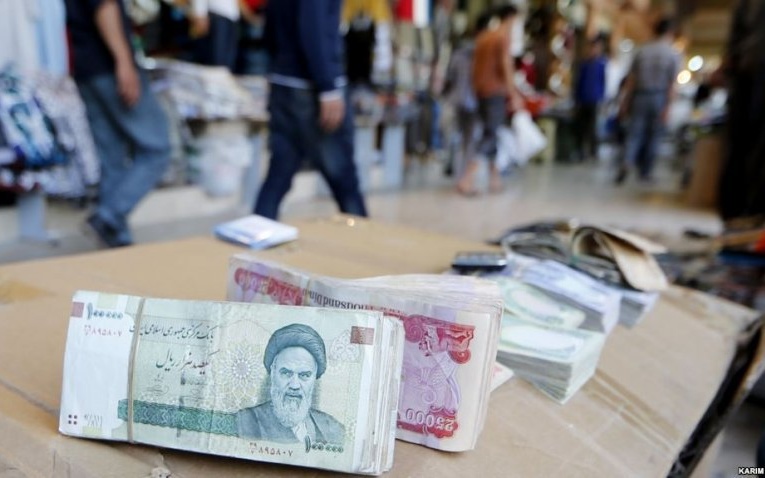Amid international sanctions, the aftermath of Israel’s 12-day war in June, and internal problems, Iran’s economy is sinking into recession.
The World Bank projects that Iran’s GDP will contract by 1.7% in 2025 and by 2.8% in 2026. In April, the Bank had forecast that the economy would grow by 0.7% this year.
In contrast, the Bank expects the MENAAP region — the Middle East, North Africa, Afghanistan and Pakistan — to grow 2.8% in 2025.
Iran has been facing the challenge of relatively low global oil prices, in conjunction with the comprehensive sanctions levied by the US since 2018. While China remains Iran’s largest customer, Tehran has been offering discounts to maintain the exports.
At the end of September, the UN’s “snapback” sanctions took effect over Iran’s nuclear programme. The restrictions were imposed because of the Islamic Republic’s breaking of the terms of the 2015 agreement with the 5+1 Powers, raising uranium enrichment to 20% and then 60%, following the American withdrawal from the pact.
Iran has caused further discord by restricting inspections and the provision of information to the International Atomic Energy Agency. Tehran was censured by the IAEA Board of Governors just before Israel’s deadly assault in June.
That war not only crippled Iran’s nuclear facilities, with bombing by the US as well as Israel, but also caused substantial damage to infrastructure.
Already at a historic low, the Iranian currency sank because of the war. Rocked further by the snapback sanctions, the rial stands at 1,162,000:1 v. the US dollar.
In early 2018, before the US withdrawal from the nuclear agreement and comprehensive sanctions, the rial was 45,000:1 v. the dollar.
Trying to cover the scale of the depreciation, Iran’s Parliament has voted to remove 4 zeroes from the currency, bringing the rial to 116:1.
A further shock may be on the way with the loss of Iran’s last major European market for its gas.
Turkey may meet more than half of its gas needs by the end of 2028 by ramping up production and increasing US imports. The Trump Administration has urged Ankara to move away from Iran and Russia, with Donald Trump press Turkish President Recep Tayyip Erdoğan in a White House meeting on September 25.


Latest IMF report projects Iranian economy will continue growing: https://www.imf.org/en/Publications/WEO/Issues/2025/10/14/world-economic-outlook-october-2025
0.6% growth for 2025 and 1.1% for 2026. Inflation will remainat around 40% and unemployment at around 9%.
Iran’s New Espionage Law: Death for Social Media Posts and Other ‘Crimes’
https://iranwire.com/en/politics/145624-irans-new-espionage-law-death-for-social-media-posts-and-other-crimes/
[Reader’s Note: This IMF projection from July, which did not account for Israel’s war and snapback sanctions, has been overtaken by the World Bank’s October forecast.]
IMF predicts Iran’s economy will continue growing in 2025 (0.6%) and 2026 (1.1%): https://www.imf.org/en/Publications/WEO/Issues/2025/07/29/world-economic-outlook-update-july-2025
India has resuming buying Iranian oil after being told not to import Russian oil: https://wanaen.com/india-emerges-as-irans-new-oil-buyer-after-snapback/
[Editor’s Note: The UN’s snapback sanctions did not come into effect until the end of September.]
Iran’s oil exports hit 1.9 mln bpd in September: https://www.iranoilgas.com/news/details.aspx?id=28131&title=Iran%E2%80%99s+oil+exports+hit+1.9+mln+bpd+in+September%3A+TankerTrackers
“Iran’s crude oil exports in September 2025 surged to levels unseen since mid-2018, reaching more than 1.9 million barrels per day, according to TankerTrackers. ….Observers note that when the sanctions formally snapped back, many expected exports to collapse. Instead, tankers kept loading, ships kept sailing, and China kept receiving cargoes. The result: Iran’s oil continues to flow — but now through a leaner, faster, and more covert export system that has evolved under renewed legal pressure.”
Oil minister reports record exports, rise in production: https://en.irna.ir/news/85961675/Oil-minister-reports-record-exports-rise-in-production
“Oil Minister Mohsen Paknejad says the country has recorded significant growth in oil production and exports despite sanctions, assuring that the possible implementation of the so-called snapback mechanism will not affect crude sales. Paknejad said on Wednesday that daily crude production has increased by more than 120,000 barrels, while exports in recent months have even reached record levels.”
This is for ommaat goosaleh, reza’a followers
https://www.instagram.com/reel/DPdM0knjgca/?igsh=MTN5aHpiNHppaWRoag%3D%3D
Note. U.N sanctions do not target Iranian oil exports but there are some restrictions imposed on banking activities and investment related to Iran’s proliferation-sensitive sectors (nuclear and missile). In any case, Iran is shipping oil covertly and not overtly.
[Editor’s Note: An unsupported claim from Iranian State media….]
German troops were directly involved in ‘dirty work’: https://www.tehrantimes.com/news/518889/German-troops-were-directly-involved-in-dirty-work
“New information obtained by the Tehran Times reveals that Germany’s support for Israel during the 12-day war extended beyond political and diplomatic statements. Berlin, in fact, played an active role in helping Israel achieve its war goals by deploying troops to the occupied territories…..A member of the Israeli army with knowledge of the matter has told Iranian intelligence that a group of German military forces was stationed in Israel at the request of the regime during the 12-day war. They participated in military operations, under an agreement that required Israel to keep Germany’s involvement a secret. The agreement was made in confidentiality between German and Israeli commanders, but it has been obtained by Iranians.”